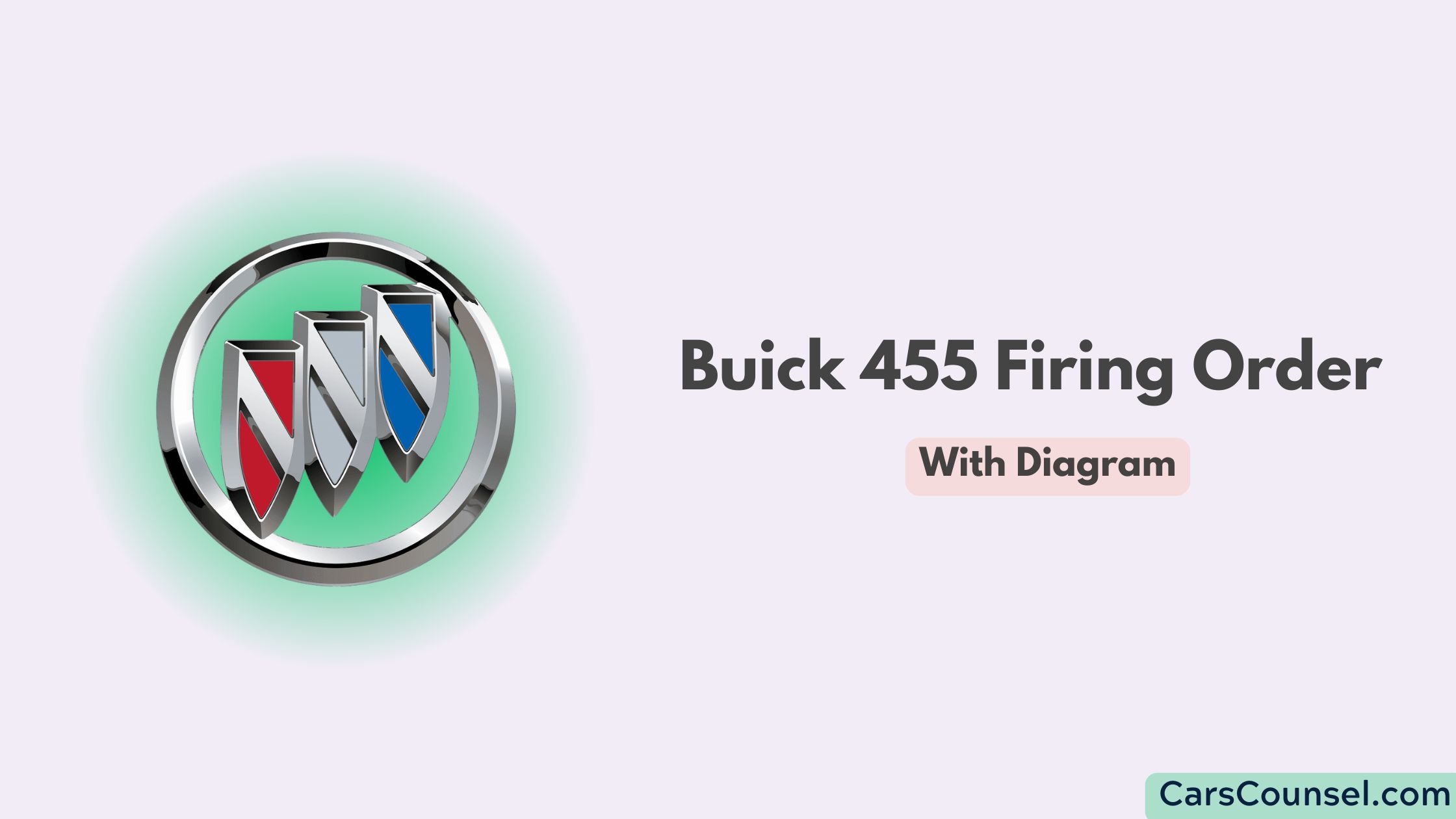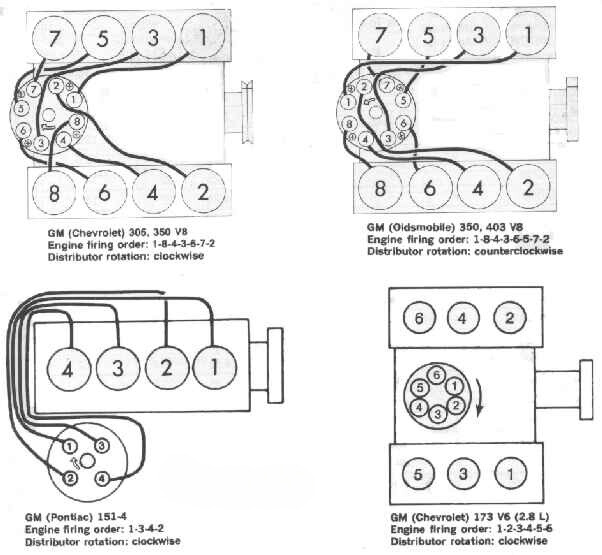The Buick 455 engine, a legendary big-block V8, became a staple in high-performance vehicles during the late 1960s and early 1970s. Known for its torque-rich output and reliability, this engine remains popular among enthusiasts. Understanding the firing order of the Buick 455 is crucial for maintaining performance, diagnosing issues, and ensuring smooth operation.

Quick Navigation
Buick 455 Firing Order Explained
The firing order for the Buick 455 is 1-8-4-3-6-5-7-2. This sequence is standard for most V8 engines and plays a critical role in the engine’s performance and durability.

Cylinder Numbering
- Driver’s side bank (left):
- Front to rear: Cylinders 1, 3, 5, 7
- Passenger’s side bank (right):
- Front to rear: Cylinders 2, 4, 6, 8
The firing order alternates between the left and right cylinder banks, maintaining balance and minimizing vibrations.
Overview of the Buick 455 Engine
The Buick 455, introduced in 1970, was part of Buick’s V8 engine lineup. It delivered immense power, making it a favorite for muscle cars like the Buick GSX. Its unique design and firing order contributed significantly to its performance.
Key Specifications
- Engine type: Naturally aspirated V8
- Displacement: 455 cubic inches (7.5 liters)
- Compression ratios: Varied from 8.5:1 to 10.5:1
- Power output: Up to 370 horsepower and 510 lb-ft of torque (stock configurations)
Firing Order Defined
The firing order is the sequence in which the spark plugs ignite the air-fuel mixture in each cylinder. This sequence ensures balanced power delivery and engine stability.
Importance of the Firing Order
The Buick 455 firing order directly affects the engine’s functionality. Here’s why it matters:
Engine Balance
The proper sequence ensures even distribution of power across all cylinders, minimizing vibrations and improving drivability.
Smooth Operation
Correct firing reduces mechanical stress, allowing the engine to idle smoothly and operate efficiently at high RPMs.
Performance Optimization
The firing order works in tandem with the crankshaft design to maximize power delivery and torque.
Diagnosing Firing Order Issues
Firing order problems in the Buick 455 can lead to noticeable engine issues. These problems often stem from ignition system faults, timing misalignment, or mechanical failures.
Common Symptoms
Misfires:
- Uneven power delivery.
- Hesitation or sputtering during acceleration.
Rough Idling:
- Irregular engine sounds.
- Increased vibrations while stationary.
Loss of Power:
- Reduced torque and acceleration.
- Poor fuel efficiency.
Backfiring:
- Loud popping noises from the exhaust or intake.
Potential Causes
- Crossed Plug Wires: Incorrect wire routing disrupts the firing sequence.
- Faulty Ignition Components: Worn spark plugs or failing ignition coils prevent proper spark delivery.
- Timing Issues: Incorrect distributor or camshaft timing alters the sequence.
Steps to Fix Firing Order Problems
Fixing firing order issues involves inspecting and realigning ignition components. Here’s a step-by-step guide:
Verify Firing Order:
- Confirm the sequence is 1-8-4-3-6-5-7-2.
- Check the cylinder numbering to ensure proper wire connections.
Inspect Spark Plug Wires:
- Ensure each wire connects to the correct cylinder.
- Look for cracks, wear, or damage.
Check Distributor Cap:
- Inspect for carbon buildup or cracks that could disrupt spark distribution.
Replace Faulty Components:
- Replace worn spark plugs, damaged wires, or faulty ignition coils.
Align Timing:
- Use a timing light to check and adjust the distributor for proper ignition timing.
Maintenance for Optimal Firing Order
Routine maintenance prevents firing order-related issues and ensures the Buick 455 runs smoothly. Follow these tips:
Replace Spark Plugs Regularly:
- Change spark plugs every 30,000 to 50,000 miles, depending on their type and wear.
Inspect Ignition Wires:
- Replace wires showing signs of wear or damage to maintain consistent spark delivery.
Test Ignition Timing:
- Periodically use a timing light to verify the distributor is correctly aligned.
Keep the Distributor in Good Condition:
- Inspect the cap and rotor for damage during regular tune-ups.
Performance Impact of Correct Firing Order
Adhering to the correct firing order ensures the Buick 455 delivers its full potential. Here’s how:
Enhanced Power:
Balanced firing ensures all cylinders contribute evenly to the engine’s power output, maximizing torque.
Improved Fuel Efficiency:
Even combustion reduces wasted fuel, optimizing mileage.
Longevity:
Smooth operation reduces wear on internal components, extending the engine’s lifespan.
FAQs About Buick 455 Firing Order
Can the firing order change over time?
No, the firing order is fixed by the engine’s design. Problems may arise from incorrect wiring or timing.
How do I confirm the firing order is correct?
Verify spark plug wire connections against the sequence 1-8-4-3-6-5-7-2 and cylinder numbering.
Does firing order affect exhaust sound?
Yes, the firing order influences the exhaust note. The Buick 455’s firing order contributes to its signature V8 rumble.
What happens if the firing order is wrong?
An incorrect firing order causes misfires, rough operation, and potential damage to internal engine components.
Engines with Similar Firing Orders
- 2008 Buick Lacrosse Firing Order
- 2012 Buick Enclave Firing Order
- 2009 Buick Enclave Firing Order
- 2008 Buick Enclave Firing Order
- 2011 Buick Lacrosse Firing Order
Conclusion
The Buick 455 firing order of 1-8-4-3-6-5-7-2 is critical for the engine’s performance, balance, and longevity. Understanding this sequence simplifies troubleshooting, enhances maintenance, and ensures the engine delivers its full potential. By regularly inspecting ignition components and maintaining proper timing, you can keep your Buick 455 running smoothly and reliably for years to come.

